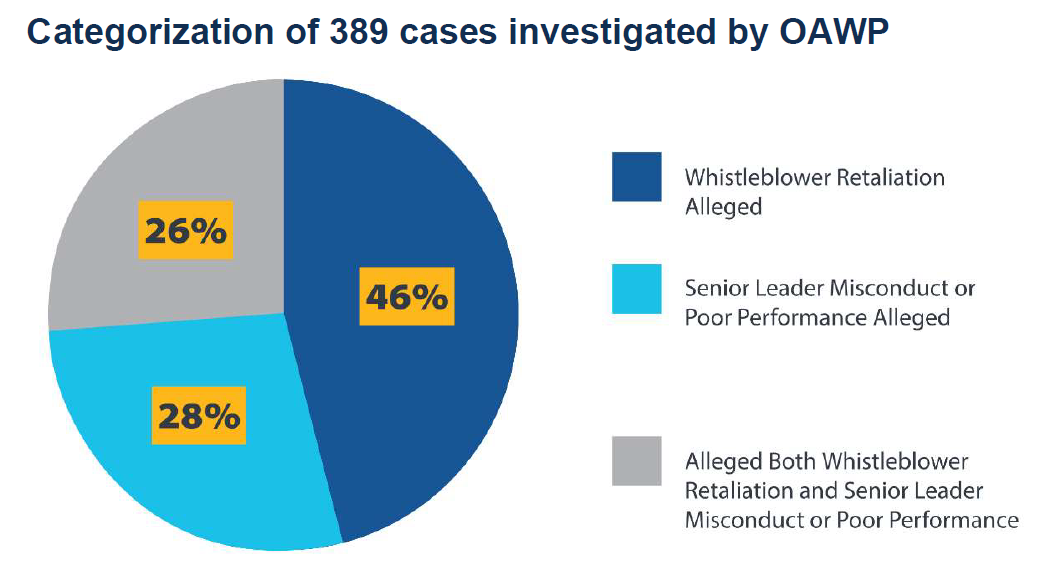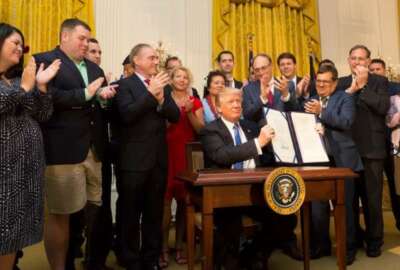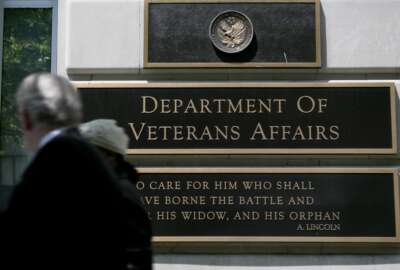VA’s accountability office recommended 7 senior leaders for discipline within 18-month period
The still relatively-new accountability office at the Department of Veterans Affairs has received thousands of complaints during an 18-month period, yet it's...
The office designed to hold top leaders accountable for poor performance, misconduct and retaliation at the Department of Veterans Affairs has received thousands of complaints and recommended disciplinary action against seven senior leaders and supervisors.
According to its latest report to Congress, VA’s Office of Accountability and Whistleblower Protection received 3,463 complaints from Oct. 2018 through May 31, 2020.
A total of 39,818 VA supervisors and more than 1,000 senior leaders fall within OAWP’s investigative scope for whistleblower retaliation, poor performance or misconduct.
VA’s accountability office has recommended disciplinary action against six senior leaders for misconduct and one supervisor for whistleblower retaliation during the 18-month reporting period.
At least one of OAWP’s recommended disciplinary actions was not implemented. In that situation, OAWP recommended a suspension for the chief of staff at a VA medical center who had closed a surgery program without following departmental policy or ensuring a community referral process was in place. The chief of staff’s actions “potentially endangered veterans’ care,” OAWP said.
But the director of this particular VA medical center chose not to follow through with OAWP’s recommended course of disciplinary action.
In other instances, VA did act on OAWP’s recommendations. The department, for example, demoted a VA medical center chief of staff to a non-supervisory position after that individual failed to separate an employee from an alleged sexual harasser.
Another case ended differently. OAWP found a VA supervisory physician had retaliated against an employee. The VA accountability office recommended corrective actions for both the physician and the whistleblower.
“The VAMC could not implement OAWP’s recommended disciplinary action as the supervisory physician is no longer a VA employee; however, the VAMC implemented OAWP’s recommendation for corrective action for the whistleblower,” the report reads.
Though a majority, or 69%, of the 3,463 complaints OAWP received within the 18-month reporting period fall outside the VA accountability office’s scope of responsibility, one recommendation for disciplinary action against a supervisor for whistleblower retaliation seems to fall short, said Chris Pappas, chairman of the House Veterans Affairs Subcommittee on Investigations and Oversight. He said the latest report from OAWP is yet another “clear sign” the office is failing whistleblowers.
About 20% of the complaints were considered whistleblower disclosures and also fell outside OAWP’s purview. The remaining 11%, or 389 cases, were turned over to OAWP for investigation.

The president created the VA Office of Accountability and Whistleblower Protection (OAWP) through an executive order in 2017, and Congress codified the office into law a year later. The office was designed to investigate employee misconduct and safeguard employees who reveal waste, fraud and abuse from retaliation.
But the office has been under near constant fire since its creation. VA’s inspector general said OAWP had failed to protect whistleblowers and misinterpreted its statutory functions. Lawmakers last fall said they’ve been fielding complaints about the office since the beginning,
Federal employment attorneys and VA employees themselves have told Federal News Network they didn’t trust OAWP to properly handle their cases.
In its reporting last fall on OAWP, Michael Missal, VA’s inspector general, acknowledged it would take time for the VA accountability office to reverse a longstanding culture of fear, retaliation and mismanagement at the department — and within the office itself.
OAWP and its leader Tamara Bonzanto, herself a veteran, nurse and former investigator with the House Veterans Affairs Committee, has vowed to improve the accountability office’s culture.
The latest report from OAWP is relatively light on details and contains brief descriptions of the steps the office said it was taking to improve the quality of its investigations and internal office operations.
The VA accountability office issued standard operating procedures back in December, which describe how OAWP employees should handle new complaints and investigate them, refer cases for further investigation and confirm VA compliance with its own recommendations.
OAWP formed a quality assurance division last year, which checks the way the VA accountability office receives, reviews, refers and investigates cases.
“As part of our commitment to restore stakeholder confidence in OAWP, we are undertaking a comprehensive review of cases filed between June 2017 and June 2019 that alleged whistleblower retaliation but were closed without recommendation for disciplinary action,” the report reads. “If investigative deficiencies are identified, OAWP will resolve those deficiencies and, if appropriate, recommend disciplinary action against the individuals who engaged in retaliation and corrective action for the whistleblower.”
The office also has a 120-day goal to complete investigations. OAWP added 16 more investigators, and a team of more seasoned employees works through the most complicated and high-profile cases.
OAWP said it’s also made progress on its backlog of pending cases. The VA accountability office identified 572 cases in late 2019; OAWP tracked 205 cases in the backlog in late May of this year.
In its hearings before Congress last fall, OAWP pinned much of its forthcoming improvements on training. The accountability office said it teamed up with the Office of Special Counsel and the VA inspector general to develop an initial version of whistleblower training, which all employees are supposed to have finished by July 4.
A second iteration of OAWP whistleblower training is in the works, as is a new intake form, where complainants can track their cases through a unique hyperlink.
To improve communication with its stakeholders, OAWP said it’s hired a government information specialist to overhaul its FOIA operations. All OAWP employees take customer service training, the office added.
Still, OAWP’s latest report has done little to sway its critics in Congress.
“Years after the office was established, they’ve made only modest steps toward implementing basic procedures for investigating allegations, establishing training for employees and tracking cases,” Pappas said. “We need to see that OAWP is actually listening to Congress and doing its job to protect workers who risk their careers to do right by our veterans.”
Copyright © 2025 Federal News Network. All rights reserved. This website is not intended for users located within the European Economic Area.
Nicole Ogrysko is a reporter for Federal News Network focusing on the federal workforce and federal pay and benefits.
Follow @nogryskoWFED
Related Stories
 Exclusive
Exclusive 



